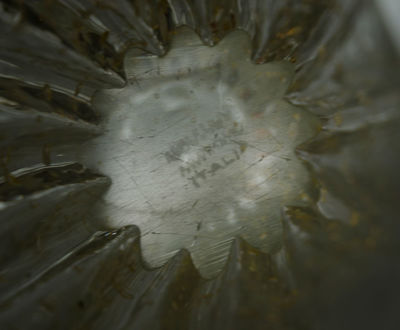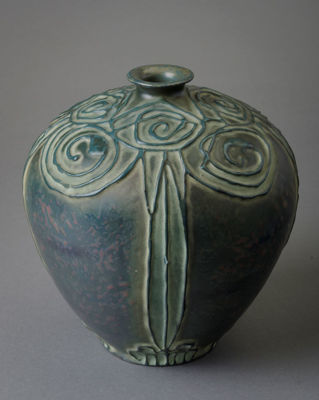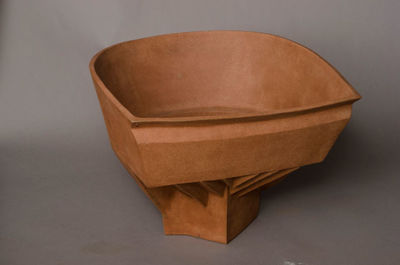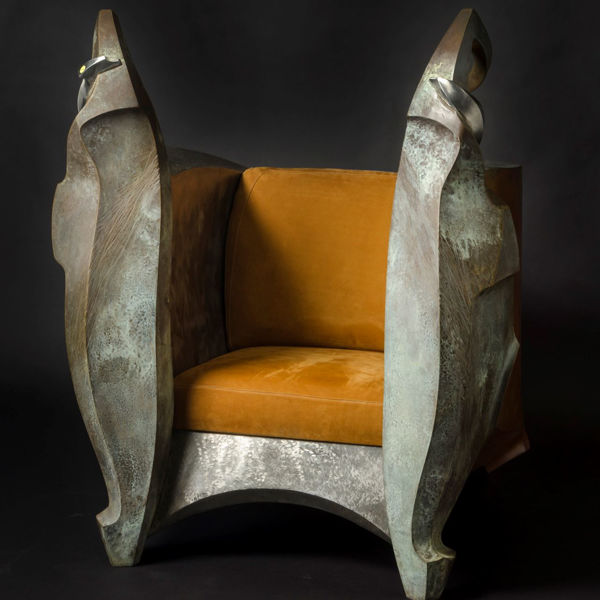Decorative and Design
Title: Vase
McGowan is Inspired by nature, architecture, and seams of tailored clothing. The merging of these three inspirations transform flat porcelain slabs into functional structures of use. She creates illusion in her utilitarian pots with repetitive textures creating patterns to enhance volume or create a visual depth on her forms.
Title: Vase Drabware
Two drabware items from Wedgwood across the early 19th century. Each of these pieces speaks of a resolvedly classical influence as Wedgwood looked to the storied “etruscan” vessels fashionable in private collections for pattern & design. The drabware vase & candlestick are particularly rare examples, the ware only sparingly utilised by the company before being dropped at around 1860 — and now highly sought after for its uniquely earthy and neutral tone, produced through the use of Cornish clay with flint and nickel and made popular again by a contemporary revival from 1970 onward. Here the duo is delicately decorated with applied relief in lilac acanthus and white bellflowers. Provenance: Property of the Saint Louis Art Museum, Sold to benefit the acquisition fund.
Title: Vase in Matte Green
Vase in matte green glaze with stylized flowers, Colorado Springs
Title: Vase with Lotus
Vase painted with lotus in cuerda seca, Boston, MA, ca. 1925; Paul Revere Pottery medallion; 6 1/2" x 3 1/2";
Title: Vase with Organic Pattern
Keramis glazed stoneware vase with stylized organic pattern, Belgium, 1920s; Black Boch Freres stamp, Ch. Catteau, Gres Keramis, D775/901C; 9" x 6 1/2";
Title: Vase with Snails
Vase with snails, eosin glaze, Pecs, Hungary, ca. 1900; Raised five churches medallion, stamped 6340/M; 8 1/2" x 6 1/2"
Title: Vessel
Swindell’s miniature ceramics explore a preciousness of object, the artist creating vessels at a reduced scale and with a delicacy and softness that attenuates each pot down to a natural, almost shell-like form. This sensation, in part, is created through the use of a porcelain body with paper-thin wheel-thrown walls (given residual strength through a high temperature firing) onto which Swindell applies varieties of textural depth and blushing colour glazes. Within this set the biological motif is undermined by a curious unfamiliarity and sense of exoticism — the decorative elements rooted in a fantasy that bridges abstraction with the familiar organic patterns, and finds an particular intensity in the otherworldly imagination and conveyed sense of movement.
Title: Vessel
Swindell’s miniature ceramics explore a preciousness of object, the artist creating vessels at a reduced scale and with a delicacy and softness that attenuates each pot down to a natural, almost shell-like form. This sensation, in part, is created through the use of a porcelain body with paper-thin wheel-thrown walls (given residual strength through a high temperature firing) onto which Swindell applies varieties of textural depth and blushing colour glazes. Within this set the biological motif is undermined by a curious unfamiliarity and sense of exoticism — the decorative elements rooted in a fantasy that bridges abstraction with the familiar organic patterns, and finds an particular intensity in the otherworldly imagination and conveyed sense of movement.
Title: Vessel
Swindell’s miniature ceramics explore a preciousness of object, the artist creating vessels at a reduced scale and with a delicacy and softness that attenuates each pot down to a natural, almost shell-like form. This sensation, in part, is created through the use of a porcelain body with paper-thin wheel-thrown walls (given residual strength through a high temperature firing) onto which Swindell applies varieties of textural depth and blushing colour glazes. Within this set the biological motif is undermined by a curious unfamiliarity and sense of exoticism — the decorative elements rooted in a fantasy that bridges abstraction with the familiar organic patterns, and finds an particular intensity in the otherworldly imagination and conveyed sense of movement.
Title: Vessel
Swindell’s miniature ceramics explore a preciousness of object, the artist creating vessels at a reduced scale and with a delicacy and softness that attenuates each pot down to a natural, almost shell-like form. This sensation, in part, is created through the use of a porcelain body with paper-thin wheel-thrown walls (given residual strength through a high temperature firing) onto which Swindell applies varieties of textural depth and blushing colour glazes. Within this set the biological motif is undermined by a curious unfamiliarity and sense of exoticism — the decorative elements rooted in a fantasy that bridges abstraction with the familiar organic patterns, and finds an particular intensity in the otherworldly imagination and conveyed sense of movement.
Title: Vessel
Swindell’s miniature ceramics explore a preciousness of object, the artist creating vessels at a reduced scale and with a delicacy and softness that attenuates each pot down to a natural, almost shell-like form. This sensation, in part, is created through the use of a porcelain body with paper-thin wheel-thrown walls (given residual strength through a high temperature firing) onto which Swindell applies varieties of textural depth and blushing colour glazes. Within this set the biological motif is undermined by a curious unfamiliarity and sense of exoticism — the decorative elements rooted in a fantasy that bridges abstraction with the familiar organic patterns, and finds an particular intensity in the otherworldly imagination and conveyed sense of movement.



























